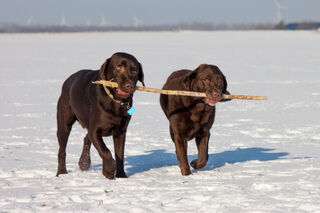Play
How Well Can Dog Owners Predict Their Dog's Behavior?
Dog ownership alone does not improve the ability to predict future behavior.
Posted December 8, 2020 Reviewed by Abigail Fagan
Have you ever been in this situation? You’re at the park with your dog when another dog-owner pair arrives. While the dogs get to know each other, you and the other person discuss their behavior. Often dog owners disagree – while you might believe the dogs are just playing, the other might be scared that this is an aggressive encounter.

I often get into these situations, and most of the time I’m the one arguing that the dogs are capable of solving their social situations on their own. But people often tell me, “your dog is growling, she seems aggressive, etc.” I usually respond by discussing an elegant study done in Hungary a while ago, which proved that dogs don’t just growl to defend themselves or their resources (Farrago et al 2010). In that study, dog growls were recorded in three different situations: while the dog was threatened by a stranger, while defending food from a conspecific, and while playing tug-of-war with the owner. If you are familiar with dogs, you might be able to guess what the study found: playful growls sound very different from food envy growls. This difference was supported by acoustic analyses of the growling sounds.
But do dogs also understand the difference? To test this, a subject dog was presented with a yummy bone. Of course the dog would like to eat it immediately, but whenever the dog approached the bone, a growl was played through a loudspeaker. Under these circumstances, would the dog touch the bone or recoil? It turned out that dogs actually understood the growl of their conspecifics. If an aggressive growl came from the loudspeaker, the dogs hesitated much longer before touching the bone. If the test dogs heard playful growls, however, they did not hesitate at all. Thus, we can conclude that dogs can distinguish whether growls are aggressive or not.
Discussions in the dog park are rarely so easily settled. But maybe it doesn't matter how we interpret the present situation, such as whether it's playful or aggressive. Perhaps it is more important that we can predict what is going to happen next—whether there will be a serious fight and if we should intervene. Here, experience with dogs should help us know when to separate the squabblers.
That is why my colleagues and I came up with the idea for the study that just came out in the journal Scientific Reports (Donnier et al 2020). We collected video clips of real-life dog interactions in addition to interactions among macaques and among human children. Then we presented these clips to participants and asked them to predict the outcome of the observed interactions. Participants were dog owners, parents or people who work with children, or primatologists (researchers who work with non-human primates). Overall, our participants were quite good at predicting those interactions, mostly performing better than chance.
But then came a big surprise: experience did not matter for the dog owners – they were not better at predicting social interactions between two dogs than people without dog experience. Another result was even a bit worrying: all participants, whether they owned a dog or not, performed quite badly when predicting aggressive outcomes in dogs. Thus, participants were better at predicting the outcome of dogs playing with each other than they were when dogs insistently defended a toy, for example.
So what should you remember next time you’re in one of these debates at the park? In general, people are pretty good at predicting dog behavior, but dog ownership alone does not improve our ability to do so. However, scientific experience with dogs might help. We found that primatologists indeed predict macaque behavior better than inexperienced people. Thus, we can expect that dog professionals make better predictions than dog lovers – it’s part of their job, after all – but we’ll need more studies to prove that.
References
Faragó, T., Pongrácz, P., Range, F., Virányi, Z., & Miklósi, Á. (2010). 'The Bone Is Mine': Affective and Referential Aspects of Dog Growls. Animal Behaviour, 79(4), 917-925. doi:10.1016/j.anbehav.2010.01.005
Donnier, S., Kovács, G., Oña, L. S., Bräuer, J., & Amici, F. (2020). Experience has a limited effect on humans’ ability to predict the outcome of social interactions in children, dogs and macaques. Scientific Reports, 10(1), 21240. doi:10.1038/s41598-020-78275-5


